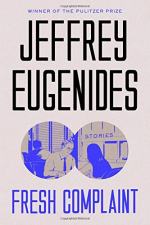|
This section contains 510 words (approx. 2 pages at 400 words per page) |

|
Fresh Complaint Summary & Study Guide Description
Fresh Complaint Summary & Study Guide includes comprehensive information and analysis to help you understand the book. This study guide contains the following sections:
This detailed literature summary also contains Quotes and a Free Quiz on Fresh Complaint by Eugenides, Jeffrey.
The following version of this book was used to create this study guide: Eugenides, Jeffrey. Fresh Complaint. Farrar, Straus and Giroux, 2017.
Fresh Complaint is a collection of short stories by Jeffrey Eugenides, written between 1995 and 2017. They depict the internal conflicts of his characters who must endure the obligations imposed on them by societal expectations on marriage, financial success, and gender. Each story encapsulates a scene in which the character must face their desire and as a result suffer the material and emotional consequences of their actions. As a whole, this collection is concerned with the inevitability of cause and effect on the tragic outcomes of characters who want to live their lives truthfully and pursue their desires, at the expense of those they love.
The collection also explores marriage issues and infidelity. "Complainers," "Early Music," "Find the Bad Guy," "Capricious Gardens," and "Fresh Complaint" all deal with failing marriages, and both "Find the Bad Guy" and "Fresh Complaint" portray infidelity explicitly. The main characters are dissatisfied with their lives, often self-deprecating, and seek something in the past or outside of their marriage in order to assuage the pain of their disillusionment. These characters must contend whether to preserve their true selves and passions, or save their marriage. The struggle between the true self and societal expectations on marriage ignites the conflict in many of these stories.
Eugenides' characters are fraught with financial problems, bankruptcy, or retirement issues. The protagonists of "Complainers," "Early Music," "Timeshare, and "Great Experiment" struggle with financial woes and must find satisfaction despite their economic struggle. Their self-esteem is greatly dictated by financial success and thus their failure to acquire financial stability is perceived as a personal fault. Characters must face the source of their dissatisfaction and come to terms with the limits of their talents and gains. Eugenides characterization is complex, and rarely does he offer a moral compass with which to judge the moral vicissitudes that the characters contend with.
Gender expectations also pose an obstacle in the characters' personal development, especially in "Complainers," "Baster," and "Oracular Vulva." Both expectations on men and women's roles force characters to conform to situations that they find miserable, and it is when they are able to break these expectations through taboo that their characters achieve better knowledge of themselves. The roles of men and women are re-evaluated, but not without controversy. Several of Eugenides' narrators remark nostalgically of a time past, when mythical wives would do house work and care for their husbands.
The short stories in this collection are sympathetic and complex portraits of characters whose desires and current circumstances are at odds. Their decisions, although controversial, are depictions of the complex and often illogical choices that people make in order to regain access to their desires. Eugenides refrains from offering moral judgement, but his characters nonetheless suffer the tragic consequences of their choices. The reader is invited to observe in Eugenides' characters a fragment of the real psyche that plagues people who wonder, what would happen if the forbidden desire is indulged.
Read more from the Study Guide
|
This section contains 510 words (approx. 2 pages at 400 words per page) |

|



